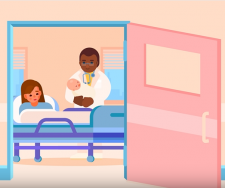Everything you wanted to know about genetic engineering in one chirpy video
By Michael Cook,
BioEdge [citing CGS' Elliot Hosman]
| 09. 16. 2016
This chirpy video about genetic engineering explains the complex present and speculative future quite well although it probably takes too optimistic a view of how the new technology will be used. Elliot Hosman, of the Center for Genetics and Society, grumbles that it:
... adopts an exceedingly narrow vision of democratic progress and governance. “The only thing we know for sure,” it asserts, “is that things will change irreversibly.” By this logic, technology’s impending arranged marriage to biology is inevitable, and we might as well sit back and watch the Silicon Valley “cradle of innovation” unburden us from our human imperfections—one human birthing experiment at a time.
However, it has been extremely popular. Released in August by the German company Kurzgesagt (“In a Nutshell”), it has clocked up 3.2 million views.
With the great public interest in CRISPR, the CGS recently produced a resource page on human germline editing. It's quite useful.
Image via Pixabay
Related Articles
By Diaa Hadid and Shweta Desai, NPR | 01.29.2026
MUMBRA, India — The afternoon sun shines on the woman in a commuter-town café, highlighting her almond-shaped eyes and pale skin, a look often sought after by couples who need an egg to have a baby.
"I have good eggs,"...
By Steve Rose, The Guardian | 01.28.2026
Ed Zitron, EZPR.com; Experience Summit stage;
Web Summit 2024 via Wikipedia Commons licensed under CC by 2.0
If some time in an entirely possible future they come to make a movie about “how the AI bubble burst”, Ed Zitron will...
By Arthur Lazarus, MedPage Today | 01.23.2026
A growing body of contemporary research and reporting exposes how old ideas can find new life when repurposed within modern systems of medicine, technology, and public policy. Over the last decade, several trends have converged:
- The rise of polygenic scoring...
By Daphne O. Martschenko and Julia E. H. Brown, Hastings Bioethics Forum | 01.14.2026
There is growing concern that falling fertility rates will lead to economic and demographic catastrophe. The social and political movement known as pronatalism looks to combat depopulation by encouraging people to have as many children as possible. But not just...




